酒店管理背景英文文献
酒店服务质量管理外文文献翻译
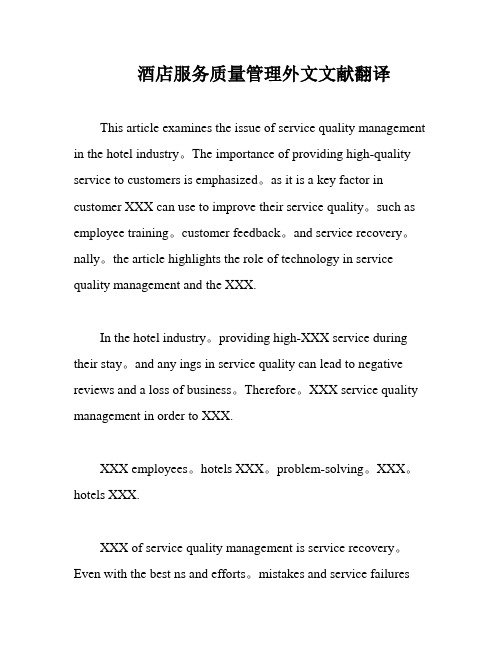
酒店服务质量管理外文文献翻译This article examines the issue of service quality management in the hotel industry。
The importance of providing high-quality service to customers is emphasized。
as it is a key factor in customer XXX can use to improve their service quality。
such as employee training。
customer feedback。
and service recovery。
nally。
the article highlights the role of technology in service quality management and the XXX.In the hotel industry。
providing high-XXX service during their stay。
and any ings in service quality can lead to negative reviews and a loss of business。
Therefore。
XXX service quality management in order to XXX.XXX employees。
hotels XXX。
problem-solving。
XXX。
hotels XXX.XXX of service quality management is service recovery。
Even with the best ns and efforts。
mistakes and service failuresXXX must have a plan in place for addressing these XXX refunds。
2018-2023年酒店管理的参考文献

2018-2023年酒店管理的参考文献随着全球旅游业的快速发展,酒店管理作为旅游行业的重要组成部分,也迎来了前所未有的发展机遇和挑战。
为了更好地了解和掌握酒店管理领域的最新发展情况和趋势,我们有必要对近五年的相关文献进行全面梳理和总结。
以下是2018-2023年酒店管理领域的一些重要参考文献,供大家参考。
一、酒店管理的概念和发展趋势1. Jones, P., Lashley, C. (2019). The Routledge Handbook of Hotel Management. Routledge.这本手册全面介绍了酒店管理领域的相关概念、理论和实践,涵盖了酒店业的运营管理、营销策略、人力资源管理等方面。
对于理解酒店管理的基本概念以及把握未来发展趋势具有重要的参考价值。
2. Sigala, M. (2020). The Routledge Handbook of Tourism Management and Marketing. Routledge.这本手册从旅游管理和营销的角度探讨了酒店业的管理和营销策略,深入剖析了酒店业在全球旅游市场中的地位和挑战,对于把握行业发展趋势和市场竞争具有重要的理论参考意义。
二、酒店经营管理与服务质量提升3. Pizam, A., Mansfeld, Y. (2018). Consumer Behavior in Tourism and Hospitality Research. Springer.这本书着重研究了用户在旅游和酒店行业的行为特点,探讨了用户对酒店服务质量的评价标准和偏好。
对酒店经营管理和服务质量提升具有一定的理论指导意义。
4. Kusluvan, S. (2019). Managing Employee Attitudes and Behaviors in the Tourism and Hospitality Industry. Nova Science Publishers.这本书重点研究了旅游和酒店行业员工的态度和行为管理,分析了员工对酒店管理的影响因素以及如何有效管理员工以提升服务质量和客户满意度。
酒店管理系统外文翻译

外文翻译1:Chapte r1Introduction1。
1 BackgroundAs computer technology develops,computer management system has gonedeep inomany differentareas。
At the same time,hotels arealso seeking anewwayofcomputermanagement,whic hcan suit their business well。
Sothat the ycanmake themanagement more centralized,responsefaster,economicefficiencyimproved and decrease the cost of running and management. However,current hotelmanagement softwareisusually developed for large hotels,w hichcosts too much andiscomplicate d for medium orsmall hotels a ndmulti—functiona l hot els。
So it seems quiteimportantto develop a management system that canwidely suit medium and small hotels。
D eveloping a hotel management system with thecomplexofcomputeran d network technology notonlycanimprove the management efficiency,butalsoincrease the e conomicefficiency, decreasethecostofrunning and management ,andrealize thesharingof resources 。
酒店管理系统 外文文献 外文翻译 中英翻译
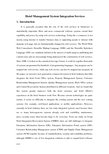
Hotel Management System Integration Services1.IntroductionIt is generally accepted that the role of the web services in businesses is undoubtedly important. More and more commercial software systems extend their capability and power by using web services technology. Today the e-commerce is not merely using internet to transfer business data or supporting people to interact with dynamic web page, but are fundamentally changed by web services. The World Wide Web Consortium's Xtensible Markup Language (XML) and the Xtensible Stylesheet Language (XSL) are standards defined in the interest of multi-purpose publishing and content reuse and are increasingly being deployed in the construction of web services. Since XML is looked as the canonical message format, it could tie together thousands of systems programmed by hundreds of programming languages. Any program can be mapped into web service, while any web service can also be mapped into program. In this paper, we present a next generation commercial system in hotel industry that fully integrates the hotel Front Office system, Property Management System, Customer Relationship Management System, Quality Management system, Back Office system and Central Reservations System distributed in different locations. And we found that this system greatly improves both the hotel customer and hot el officer’s experiences in the hotel business work flow. Because current technologies are quite mature, it seems no difficulty to integrate the existing system and the new coming systems (for example, web-based applications or mobile applications). However, currently in hotel industry there are few truly integrated systems used because there are so many heterogeneous systems already exist and scalability, maintenance, price, security issues then become huge to be overcome. From our study on Group Hotel Integration Reservation System (GHIRS), there are still challenges to integrate Enterprise Information System (EIS), Enterprise Information Portal system (EIP), Customer Relationship Management system (CRM) and Supply Chain Management system (SCM) together because of standardization, security and scalability problems, although GHIRS is one of few integration solutions to add or expand hotel softwaresystem in any size of hotel chains environment.We developed this system to integrate the business flow of hotel management by using web services and software integration technologies. In this paper, firstly we describe a scenario of hotel reservation and discuss the interaction between GHIRS and human. Secondly we analyze details of design and implementation of this system. The result and implications of the studies on the development of GHIRS are shown in the later part. Finally we discuss some problems still need to be improved and possible future directions of development.2. Hotel Reservation: A Business Case StudyOur initial thinking to develop GHIRS is to minimize the human interaction with the system. Since GHIRS is flexible and automated, it offers clear benefits for both hotel customers and hotel staff, especially for group hotel customers and group hotel companies. Group hotel companies usually have lots of hotels, restaurants, resorts, theme parks or casinos in different locations. For example, Shangri-La group has hundreds of hotels in different countries all over the world. These groups have certain customers who prefer to consume in hotels belong to the same group because they are membership of the group and can have individual services.The first step of a scenario of hotel reservation is that the consumer plans and looks for a hotel according the location, price or whatever his criteria and then decides the hotel. Then he makes a reservation by telephone, fax, internet, or mail, or just through his travel agent. When hotel staff receives the request, they first look if they can provide available services. If there is enough resource in the hotel, they prepare the room, catering and transportation for the request and send back acknowledgement. At last the guest arrives and checks in. The business flow is quite simple; however, to accomplish all these tasks is burdensome for both the consumer side and the hotel side without an efficient and integrated hotel management system.Telephone may be a good way to make a reservation because it is beyond the limit of time and space. Guests can call hotels at any time and any place. However, itcosts much when the hotel is far away from the city where guest lives; especially the hotel locates in a different country. Moreover, if there is a group of four or five people to make reservation together, it would take a long time for hotel staff to record all the information they need. Making reservation by travel agent saves consumers’ time and cost, but there is still millions of work for agent to do. They gather the requirements from consumers, then distribute to proper destination hotels. Because these hotels don’t use a same system (these thousands of hotels may use hun dreds of management systems), someone, agent or hotel staff, must face the problem how to handle information from different sources with different hotel management systems to different destinations.Web service becomes the tool to solve these problems. Our web services integrate the web server and hotel management system together, and everyone gets benefit. Booking a room easily anywhere and anytime becomes possible by using GHIRS. Consumer browses websites and finds hotel using his PC, PDA or mobile phone (WAP supported), after his identity is accepted, he can book a reservation. Two minutes later he can get the acknowledgement from the hotel by mobile phone text message or multimedia message, or email sent to his email account or just acknowledgement on the dynamic web page, if he hasn’t leave the website. The response time may take a little longer because when the hotel receives the quest, in some circumstance, hotel staff should check if there is clean and vacant room left. The web service is a standard interface that all travel agents can handle, gather and distribute the reservation information easily through internet. When the reservation request is acknowledged, hotel staff prepares the room, catering, and transportation for guests. Since the information already stored in the database, every part in the hotel chains can share it and work together properly. For example, staff in front office and housekeeping department can prepare room for guests according to the data, staff in back office can stock material for catering purpose and hotel manager can check business report in Enterprise Information Portal integrated with GHIRS by his browser. Then room rent-ratio reports, room status reports, daily income reports and other real time business reports are generated. Managers of the group can access anyreport of any hotel by the system. In the later part of this paper, we will show how consumers, agents, and hotel staff can efficiently work together by GHIRS.GHIRS is scalable for small-to-large hotel chains and management companies, especially good for hotel group. It truly soars with seamless connectivity to global distribution systems thereby offering worldwide reservation access. It also delivers real-time, on line reservations via the Internet.3. Integration of Hotel Management System3.1 Existed SystemGHIRS is developed on the base of an existed hotel management system called FoxhisTM. FoxhisTM shares the largest part of software market in hotel industry in China. FoxhisTM version 5 has distributed Client/Server architecture that the server runs SCO-UNIX and client runs Microsoft Windows and it use Sybase database on UNIX. The system includes Front Office system, Property Management system, Quality Management system, Human Resource Management system, Enterprise Information Portal system (EIP), Customer Relationship Management system (CRM) and Supply Chain Management system (SCM).This system is largely based on intranet environment. Most of the work is done in a single hotel by the hotel staff. It’s no customer self-service. If a consumer wants to book a room, hotel staff in local hotel must help the guest to record his request, although FoxhisTM system already done lots of automatic job.When the systems are deployed in different hotels that are parts of a group, sharing data becomes a problem. Just as an example, if the group has ten hotels, there would be at least ten local databases to store the consumers’ data. Because hotels need real time respond of the system, so these ten hotels can’t deploy a central database that does not locate in the same local network. Thus one guest may have different records in different hotels and the information cannot be shared. By web services as an interface, these data can be exchanged easily.3.2 DesignRecall that our initial thinking to deploy GHIRS is to save hotel staff, travel agents and consumers’ labor work the system is to link all the taches of hotel business chains. Figure1 shows how consumers, agents, hotel staff cooperate together efficiently with the system.Consumers could be divided into two categories. One is member of hotel group, who holds different classes of memberships and gains benefits like discount or special offers. These consumers usually contribute a large part of the hotel’s profit then are looked as VIP. The hotel keeps their profiles, preferences and membership account status. The other category is common guest. All these two kinds of guests and travel agents who may trade with many other hotels face the web-based interface that let them to make a reservation. For common guest, the system just requires him to input reservation information such as guest name, contact information, arrival and departure the system. The central processing server then distributes the information to appropriate hotel. Since web services technology is so good for submitting documents to long running business process flows, hotel staff could easily handle this data in and out of database management system and application server. As the membership of hotel, a user just inputs his member id and password, room information, arrival and departure date, then finish the request. Because hotels keep members’ profile, and systems exchange profile across all hotels of the group by web services, hotel staff in different hotels could know the guest’s individual re quirement and provide better services.The agents work for consumers get benefits from GHIRS as well. They may also keep the consumers’ profile and the web services interface is open to them, it is easy to bridge their system to hotel management system. Before GHIRS is deployed, the agents should separate and process the reservation data and distribute them to different hotels, which is an onerous job. But now the agents could just press one button and all the hotel reservation is sent to destination.Hotel staff receives all request from different sources. Some policies are appliedto response the request. For example, some very important guest’s request is passed automatically without confirmation, the guest could get acknowledgement in very short time. The request triggers all chains of the hotel business flow and all the preparation work is done before his arrival. But for the common customer, hotel staff would check on the anticipate date if there is vacant and clean rooms available. Because all the FoxhisTM components are integrated together, staff users needn’t change computer interface to check he room status. If it is a valid request with enough guests’ information and there is enough room left, a confirmation is sent back. If there is not enough vacant room, hotel staff will ask if guest would like to wait a time or transfer to other hotels in the hotel group or alliance hotels. In order to transfer guest’s request, data flows from local database to the central server through local web server, then it is passed to another hotels database by web services interface.3.3 ImplementationToday there are lots of platforms that could provide capabilities to integrate different system and offer other features such as security and work load balancing. The two main commercial products are Java2 Enterprise Edition (J2EE) and . They offer pretty much the same laundry of list of features, albeit in different ways. We choose .NET platform as our programming environment, however, here we don’t advo cate which platform is better or not. Our target is to integrate these decentralized and distributed systems together. In fact, both of these platforms support XML and SOAP to accomplish our task.We use Microsoft Internet Information Services (IIS) as web server and Sybase database server. The firewalls separate the local networks from the public networks. This is very important from the security point of view. Each hotel of the group has a database server, an application server and a web server to deploy this multi-tier system that includes the user interface presentation tier, business presentation tier, business logical tier, and the data access tier. C# is adopted as the programming language for the core executable part. XML is the data exchange standard format.酒店管理系统集成服务1.简介人们普遍认为,网络服务角色在企业中无疑是重要的。
酒店业 英文文献及翻译
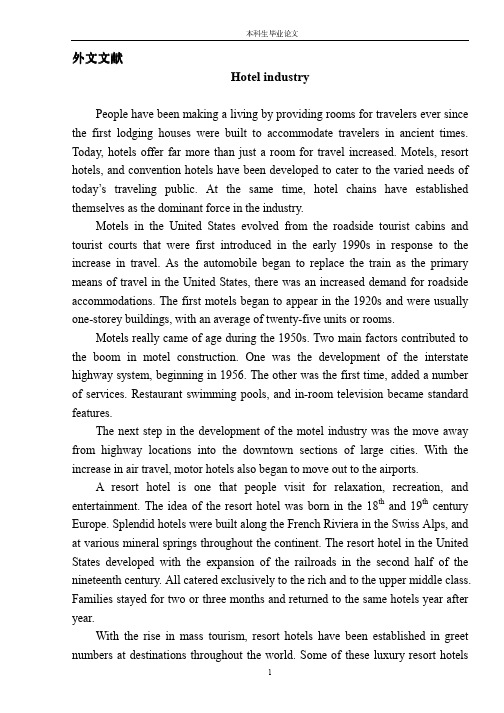
¡ ¢£¤¥¦
increased service and facilities. In fact, many turn away from such modern conveniences as in-room television, radios, and telephones. Instead, they offer the attraction of old world charm and coziness in a scenic or historic setting. Guests might expect to find working fireplaces in their rooms, handmade quilts on their beds, and antique furniture throughout the inn. Many of the inns are direct descendants of the old inns and taverns that flourished along stagecoach routes 200 years ago. The smaller country inns, sometimes with as few as three or four rooms, are usually run by friendly couples who pride themselves on the comfort and cleanliness of their accommodations and the quality of the food that they serve. Some of the larger chain hotels (e.g. Holiday Inns) use the name inn. Motor inns, however, should not be confused with country inns. The chains use the name to suggest a feeling of warmth and friendliness, though their properties quite different from the more intimate country inns. For centuries, the hotel business could well business could well be described as a cottage industry, because each hotel was a privately-owned, independent enterprise. Occasionally, a well-know hotel would successfully produce a few namesakes under the same management, but such examples were few. The first notable exception was the Caesar Ritz group. E. M. Statler was the first to point out the economic and financial advantages of operating several large hotels under a single management. Despite Statler’s success, the chain concept was slow to catch on in the period between the two world wars. Later on, Conrad Hilton, in particular, became the originator contributing to the growth of the hotel management company. Kemmons Welson and Wallace Johnson, founders of Holiday Inn, fully enriched the chain concept by franchising the Holiday Inn name and establishing a national reservation network. The chains have expanded in a number of ways. One is through direct investment. It means that the headquarters corporation itself puts up the necessary fund to build and operate a new hotel or to buy and renovate an old one. Another is by establishing management contracts with the actual owner of the hotel, whereby the chain actually takes over an empty building and operates it according to its own operating procedures for a fee or for a percentage of the profits. This method is frequently used when the chain expends into a foreign country. A somewhat similar method is the joint venture, a partnership in which both the chain and local
外文文献翻译酒店服务质量管理

毕设附件外文文献翻译原文及译文(3500 字)原文Study of Service Quality Management in Hotel IndustryBorkar;SameerAbstractIt is an attempt to understand the role of quality improvement process in hospitality industry and effectiveness in making it sustainable business enterprise. It is a survey of the presently adopted quality management tools which are making the hotels operations better focused and reliable and meet the customer expectations。
Descriptive research design is used to know the parameters of service quality management in hospitality industry。
Exploratory research design is undertaken to dig out the service quality management practices and its effectiveness. Data analysis is done and presented;hypothesis is tested against the collected data. Since the industry continuously tries to improve upon their services to meet the levels of customer satisfaction; Study presents tools for continuous improvement process and how it benefits all the stake holders。
连锁酒店的发展外文文献论文

The development of the hotel chain Economy Hotel concept and classification of economy Hotel, Budget Hotel) is compared with the traditional full-service Hotel (Full Service Hotel) is a form of the Hotel. Budget Hotel mainly use pa. Hotel, Budget Hotel, Inn, Lodge, etc. It usually refers to the investment is not high, small size, simple function, low rent, but have a certain service quality level of low class hotels. Among them, low prices and high quality service is the biggest characteristic. Economy hotel's core idea is to provide more comfortable accommodation for accommodation at the same time, the hotel need to amortization for hotel entertainment not subject facilities such as cost, makes every effort to rein in The cost at the same time to provide more low price, comfortable accommodation at the core of the clothing.1 .question about characteristic of budget hotels, scaleFrom the functions and service characteristics of budget hotel, economy hotel is to provide limited service, room service focus on core business of products;And other non-core business such as laundry services, cleaningservices, maintenance of large equipment, etc, in the form of outsourcing。
酒店管理外文文献
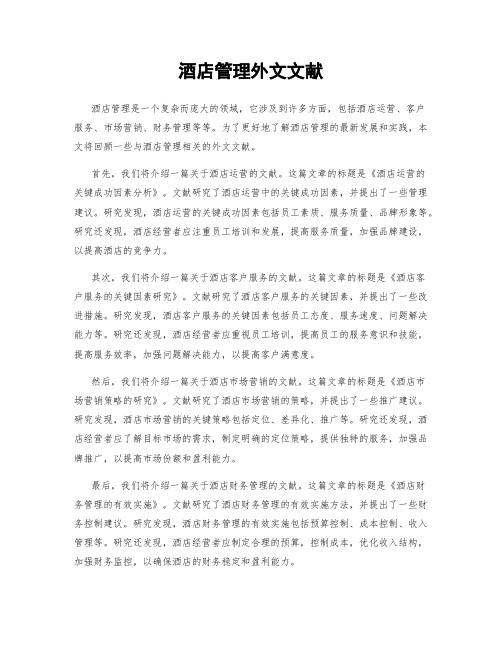
酒店管理外文文献酒店管理是一个复杂而庞大的领域,它涉及到许多方面,包括酒店运营、客户服务、市场营销、财务管理等等。
为了更好地了解酒店管理的最新发展和实践,本文将回顾一些与酒店管理相关的外文文献。
首先,我们将介绍一篇关于酒店运营的文献。
这篇文章的标题是《酒店运营的关键成功因素分析》。
文献研究了酒店运营中的关键成功因素,并提出了一些管理建议。
研究发现,酒店运营的关键成功因素包括员工素质、服务质量、品牌形象等。
研究还发现,酒店经营者应注重员工培训和发展,提高服务质量,加强品牌建设,以提高酒店的竞争力。
其次,我们将介绍一篇关于酒店客户服务的文献。
这篇文章的标题是《酒店客户服务的关键因素研究》。
文献研究了酒店客户服务的关键因素,并提出了一些改进措施。
研究发现,酒店客户服务的关键因素包括员工态度、服务速度、问题解决能力等。
研究还发现,酒店经营者应重视员工培训,提高员工的服务意识和技能,提高服务效率,加强问题解决能力,以提高客户满意度。
然后,我们将介绍一篇关于酒店市场营销的文献。
这篇文章的标题是《酒店市场营销策略的研究》。
文献研究了酒店市场营销的策略,并提出了一些推广建议。
研究发现,酒店市场营销的关键策略包括定位、差异化、推广等。
研究还发现,酒店经营者应了解目标市场的需求,制定明确的定位策略,提供独特的服务,加强品牌推广,以提高市场份额和盈利能力。
最后,我们将介绍一篇关于酒店财务管理的文献。
这篇文章的标题是《酒店财务管理的有效实施》。
文献研究了酒店财务管理的有效实施方法,并提出了一些财务控制建议。
研究发现,酒店财务管理的有效实施包括预算控制、成本控制、收入管理等。
研究还发现,酒店经营者应制定合理的预算,控制成本,优化收入结构,加强财务监控,以确保酒店的财务稳定和盈利能力。
综上所述,酒店管理是一个复杂而庞大的领域,涉及到酒店运营、客户服务、市场营销、财务管理等多个方面。
通过阅读外文文献,我们可以了解到酒店管理的最新发展和实践,从而为酒店经营者提供一些有益的管理建议和改进措施。
关于酒店的英文参考文献
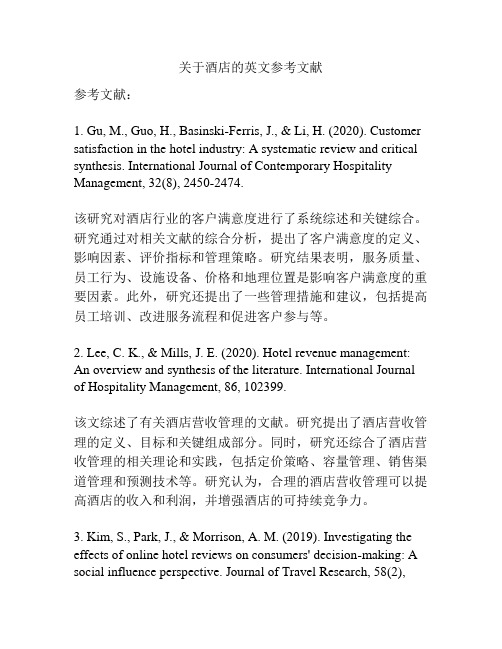
关于酒店的英文参考文献参考文献:1. Gu, M., Guo, H., Basinski-Ferris, J., & Li, H. (2020). Customer satisfaction in the hotel industry: A systematic review and critical synthesis. International Journal of Contemporary Hospitality Management, 32(8), 2450-2474.该研究对酒店行业的客户满意度进行了系统综述和关键综合。
研究通过对相关文献的综合分析,提出了客户满意度的定义、影响因素、评价指标和管理策略。
研究结果表明,服务质量、员工行为、设施设备、价格和地理位置是影响客户满意度的重要因素。
此外,研究还提出了一些管理措施和建议,包括提高员工培训、改进服务流程和促进客户参与等。
2. Lee, C. K., & Mills, J. E. (2020). Hotel revenue management: An overview and synthesis of the literature. International Journal of Hospitality Management, 86, 102399.该文综述了有关酒店营收管理的文献。
研究提出了酒店营收管理的定义、目标和关键组成部分。
同时,研究还综合了酒店营收管理的相关理论和实践,包括定价策略、容量管理、销售渠道管理和预测技术等。
研究认为,合理的酒店营收管理可以提高酒店的收入和利润,并增强酒店的可持续竞争力。
3. Kim, S., Park, J., & Morrison, A. M. (2019). Investigating the effects of online hotel reviews on consumers' decision-making: A social influence perspective. Journal of Travel Research, 58(2),215-230.该研究从社会影响的角度探讨了在线酒店评论对消费者决策的影响。
酒店管理制度英文文献
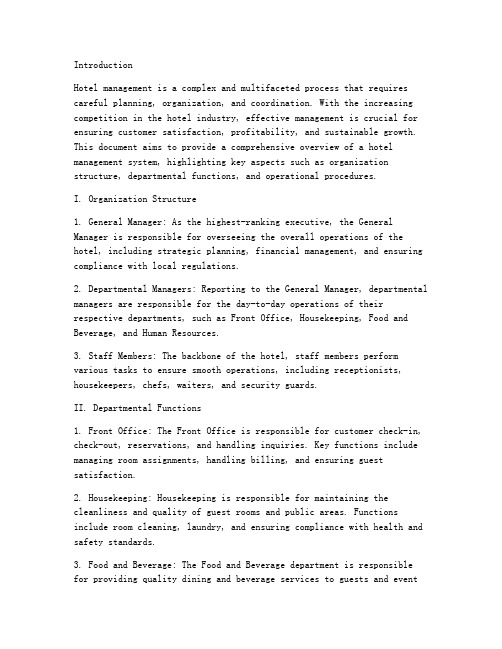
IntroductionHotel management is a complex and multifaceted process that requires careful planning, organization, and coordination. With the increasing competition in the hotel industry, effective management is crucial for ensuring customer satisfaction, profitability, and sustainable growth. This document aims to provide a comprehensive overview of a hotel management system, highlighting key aspects such as organization structure, departmental functions, and operational procedures.I. Organization Structure1. General Manager: As the highest-ranking executive, the General Manager is responsible for overseeing the overall operations of the hotel, including strategic planning, financial management, and ensuring compliance with local regulations.2. Departmental Managers: Reporting to the General Manager, departmental managers are responsible for the day-to-day operations of their respective departments, such as Front Office, Housekeeping, Food and Beverage, and Human Resources.3. Staff Members: The backbone of the hotel, staff members perform various tasks to ensure smooth operations, including receptionists, housekeepers, chefs, waiters, and security guards.II. Departmental Functions1. Front Office: The Front Office is responsible for customer check-in, check-out, reservations, and handling inquiries. Key functions include managing room assignments, handling billing, and ensuring guest satisfaction.2. Housekeeping: Housekeeping is responsible for maintaining the cleanliness and quality of guest rooms and public areas. Functions include room cleaning, laundry, and ensuring compliance with health and safety standards.3. Food and Beverage: The Food and Beverage department is responsiblefor providing quality dining and beverage services to guests and eventattendees. Functions include managing restaurants, bars, and banquet halls, as well as catering services.4. Human Resources: Human Resources is responsible for recruiting, training, and managing the hotel staff. Functions include developing and implementing HR policies, managing employee benefits, and ensuring compliance with labor laws.III. Operational Procedures1. Check-in/Check-out Process: Guests are required to present a valid ID and payment method upon check-in. The Front Office staff will assign a room, provide room keys, and handle billing. Upon check-out, guests must return room keys and settle any outstanding charges.2. Room Service: Guests can order room service by contacting the Front Office. The Food and Beverage department will prepare and deliver the requested items to the guest's room.3. Security: The hotel employs a dedicated security team to ensure the safety and security of guests and property. Security measures include patrolling the hotel premises, monitoring access points, and responding to emergencies.4. Maintenance: Regular maintenance is essential to ensure the hotel's facilities and equipment are in good working condition. Maintenancestaff are responsible for conducting routine inspections, repairing issues, and ensuring compliance with safety standards.IV. Customer ServiceCustomer satisfaction is a top priority in hotel management. To achieve this, the following practices should be implemented:1. Staff Training: Regular training programs should be conducted to enhance staff skills, knowledge, and customer service abilities.2. Feedback Collection: Guest feedback should be actively sought and analyzed to identify areas for improvement.3. Continuous Improvement: Based on feedback and performance metrics, the hotel management should strive for continuous improvement in all aspects of operations.ConclusionAn effective hotel management system is essential for ensuring smooth operations, customer satisfaction, and profitability. By implementing a well-structured organization, clear departmental functions, and operational procedures, hotels can achieve their goals and maintain a competitive edge in the industry. Continuous improvement and a focus on customer service will further enhance the hotel's reputation and ensure long-term success.。
酒店管理有关英语作文高中

酒店管理有关英语作文高中Hotel Management。
As one of the most important industries in the world, the hotel industry plays a crucial role in the global economy. Hotel management is the backbone of the hotel industry. It is the process of managing the day-to-day operations of a hotel, including staffing, marketing, customer service, and financial management.The hotel industry is a service-oriented industry, which means that the quality of service is crucial to the success of a hotel. Hotel management is responsible for ensuring that guests receive the best possible service during their stay. This includes everything from ensuring that the rooms are clean and comfortable to providing excellent customer service.One of the most important aspects of hotel management is staffing. The hotel industry is a labor-intensiveindustry, and the quality of the staff can make or break a hotel. Hotel management is responsible for recruiting, training, and managing the staff. This includes everything from hiring housekeeping staff to training front desk staff to managing the food and beverage staff.Marketing is another important aspect of hotel management. Hotel management is responsible for creating and implementing marketing strategies to attract guests to the hotel. This includes everything from advertising to social media marketing to public relations.Customer service is also a critical aspect of hotel management. Hotel management is responsible for ensuring that guests have a positive experience during their stay. This includes everything from greeting guests at the front desk to handling complaints to ensuring that guests have everything they need during their stay.Finally, financial management is an essential aspect of hotel management. Hotel management is responsible for managing the hotel's finances, including budgeting,forecasting, and financial reporting. This includes everything from managing payroll to managing expenses to managing revenue.In conclusion, hotel management is a complex and challenging field that requires a wide range of skills and knowledge. It is a critical aspect of the hotel industry and plays a crucial role in the success of hotels around the world. If you are interested in a career in hotel management, you will need to be prepared to work hard, be flexible, and be able to adapt to changing circumstances. With the right skills and knowledge, you can have a successful career in hotel management and make a positive impact on the world.。
酒店业英文文献及翻译
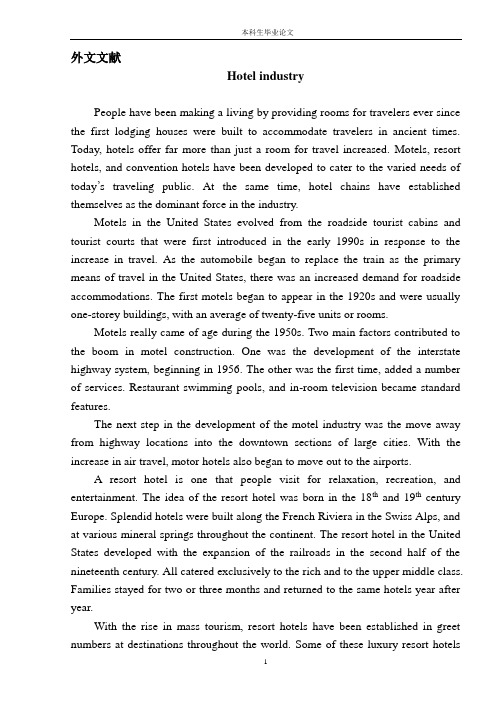
外文文献Hotel industryPeople have been making a living by providing rooms for travelers ever since the first lodging houses were built to accommodate travelers in ancient times. Today, hotels offer far more than just a room for travel increased. Motels, resort hotels, and convention hotels have been developed to cater to the varied needs of today’s traveling public. At the same time, hotel chains have established themselves as the dominant force in the industry.Motels in the United States evolved from the roadside tourist cabins and tourist courts that were first introduced in the early 1990s in response to the increase in travel. As the automobile began to replace the train as the primary means of travel in the United States, there was an increased demand for roadside accommodations. The first motels began to appear in the 1920s and were usually one-storey buildings, with an average of twenty-five units or rooms.Motels really came of age during the 1950s. Two main factors contributed to the boom in motel construction. One was the development of the interstate highway system, beginning in 1956. The other was the first time, added a number of services. Restaurant swimming pools, and in-room television became standard features.The next step in the development of the motel industry was the move away from highway locations into the downtown sections of large cities. With the increase in air travel, motor hotels also began to move out to the airports.A resort hotel is one that people visit for relaxation, recreation, and entertainment. The idea of the resort hotel was born in the 18th and 19th century Europe. Splendid hotels were built along the French Riviera in the Swiss Alps, and at various mineral springs throughout the continent. The resort hotel in the United States developed with the expansion of the railroads in the second half of the nineteenth century. All catered exclusively to the rich and to the upper middle class. Families stayed for two or three months and returned to the same hotels year after year.With the rise in mass tourism, resort hotels have been established in greet numbers at destinations throughout the world. Some of these luxury resort hotelshave survived, but today they are heavily outnumbered by resort hotels that cater to ordinary people who stay from days to weeks. With increased leisure time and higher wages, many people now take at least one vacation away from home each year. The jet airport has opened up areas of the world that were previously inaccessible to the vacationer. Resort hotel construction boomed in tropical area such as the Caribbean and Hawaii.A convention hotel is one that caters to large group gatherings. The rise of convention hotels has been one of the developments in the hotel industry, and conventioneers now account for almost 20 percent of all hotel guests. Many downtown hotels saw occupancy levels drop during the 1950s and early 1960s as motels captured a larger segment of the market. In response, some hotels began to add facilities for conventions or other group gatherings as a means of survival. At first, conventions were scheduled for off-peak periods, but as the volume of convention business increased, they began to be scheduled year-round.The business of large hotels that cater exclusively to convention groups began going up in the major cities in the later 1960s. They all feature a wide variety of restaurants, banquet rooms, meeting rooms, and convention and exhibition halls. Resort hotels, motels and airport hotels have also begun to offer convention facilities.The arrival of the jet age led to the second major hotel building period of the twentieth century, lasting from 1958 to 1974. In the early part of this period, the hotel chains’ major goals in planning new properties were economy, efficiency, and standardization of design. A Sheraton hotel in Miami, for example, might be almost identical to one nearly 3,000 miles away in Los Angeles. By the late 1960s, however, there was a reaction against this uniformity of design and new hotel architecture was born. The opening of the Hyatt marked a return to the grandeur of the old luxury hotels. Scenic elevators, fountains, waterfalls, trees, huge sculptures, and bars and cafes are included in the lobby so that it was no longer just a place for registration and checkout; it also became the main eating, drinking, and meeting area. The success of the Atlanta Hyatt Regency led to the building of similar atrium hotels in cities and combine commercial, office, and hotel facilities with sports and recreational facilities.The small country inn is a type of lodging place that has survived by offeringincreased service and facilities. In fact, many turn away from such modern conveniences as in-room television, radios, and telephones. Instead, they offer the attraction of old world charm and coziness in a scenic or historic setting. Guests might expect to find working fireplaces in their rooms, handmade quilts on their beds, and antique furniture throughout the inn. Many of the inns are direct descendants of the old inns and taverns that flourished along stagecoach routes 200 years ago. The smaller country inns, sometimes with as few as three or four rooms, are usually run by friendly couples who pride themselves on the comfort and cleanliness of their accommodations and the quality of the food that they serve.Some of the larger chain hotels (e.g. Holiday Inns) use the name inn. Motor inns, however, should not be confused with country inns. The chains use the name to suggest a feeling of warmth and friendliness, though their properties quite different from the more intimate country inns.For centuries, the hotel business could well business could well be described as a cottage industry, because each hotel was a privately-owned, independent enterprise. Occasionally, a well-know hotel would successfully produce a few namesakes under the same management, but such examples were few. The first notable exception was the Caesar Ritz group. E. M. Statler was the first to point out the economic and financial advantages of operating several large hotels under a single management. Despite Statler’s success, the chain concept was slow to catch on in the period between the two world wars. Later on, Conrad Hilton, in particular, became the originator contributing to the growth of the hotel management company. Kemmons Welson and Wallace Johnson, founders of Holiday Inn, fully enriched the chain concept by franchising the Holiday Inn name and establishing a national reservation network.The chains have expanded in a number of ways. One is through direct investment. It means that the headquarters corporation itself puts up the necessary fund to build and operate a new hotel or to buy and renovate an old one. Another is by establishing management contracts with the actual owner of the hotel, whereby the chain actually takes over an empty building and operates it according to its own operating procedures for a fee or for a percentage of the profits. This method is frequently used when the chain expends into a foreign country. A somewhat similar method is the joint venture, a partnership in which both the chain and localinvestors put up part of the capital that is necessary for new construction or the purchase of an existing building. Yet another way widely used is franchising. It is a leasing arrangement that requires the hotel operator to pay a fee for the use of the plans, manuals of procedure and advertising materials. In return, the hotel operator is granted a license to operate a business under the name of the parent corporation. The franchise operator puts up the capital, but he gets a standardized product with a predictable sales potential. He can of course also get a lot of help from the licensing corporation in establishing his operation and then in solving problems that arise after it has opened. Some franchise operations are also joint ventures, with both the corporation and the individual owner supplying part of the initial capital.There are many important competitive advantages that the hotel chains have over the individually operated hotels. The first is the resources and money on advertising and public-relations professionals at chains’ headquarters, who prepare publicity campaigns for the chain as a whole.A second advantage comes from the standardization of equipment and operating procedures. The chains publish detailed manuals that specify standardized procedures to be followed even in such tasks as making beds and setting tables. Even when the different hotels in the chain are not tightly controlled by a central office, it is customary to have an inspection system in order to guarantee the overall standards.The most important and most obvious advantage is the increased efficiency in making and controlling reservations. A guest at one hotel, for instance, can receive confirmation of a room at another within a few minutes. When a chain is owned by an airline, the traveler can make his reservations for flights and for hotel rooms at the same time and place. Hotel chains also make it easy to reserve a room by telephone in key market cities. Many of the chains are, in fact, referral systems rather than corporate owned groups. In a referral system, the operators of individual hotels or motels pay a fee to a group that has joined together in a reservation system. In most cases, the establishment is inspected by the headquarters staff of the chain to ensure that it meets the chain’s standards, it can use the name and advertising symbol, the logo for the group. In that case, the individual operation has become a chain member.Still another advantage for the chains is in increased sales potential for convention.As it is now a commonly accepted idea that conventions should combine business and pleasure, the practice of changing locations every year is very attractive to many sponsoring groups. In this way, the sponsoring group can hold its meeting in one location one year and another the next, while at the time with the assurance of very similar service and costs.Another strong point of the chain system comes from the superior planning and design of hotels. The benefits begin here even before the location is selected, because the chains have access to expensive market research data on site selection and size of the hotel. The large chains hire architects and interior decorators who specialize in hotel work. Many chains often hire consultants to advise them. The chains can either use their expert knowledge directly to build their own hotels or pass it along to others when they participate in a joint venture, a management leasing arrangement, or a franchising operation.Chains management also increases the efficiency of the total organization in other ways. For example, it permits very large bulk purchases for many kinds of equipment and supplies. The accounting and auditing systems of the chains can be centralized. A centralized personnel office for managerial and technical positions throughout the chain also provides an advantage in securing competent people. In the different hotels, management trainees can obtain experience in all the wide variety of skills that go into the operation of a hotel. Later, when they have gained the necessary expertise in several areas, these same people may return to the headquarters to direct and train others.Today, there comes very intensified competition in the hotel industry. After decades of mixed fortunes they would now face a decade when there is slow expansion, or even no growth, but with growing competition. The increased competition could rise from up-market self catering, time sharing, home entertainment and other areas, as well as from producers of a whole variety of consumer products and services. Hoteliers must ensure that they obtain their share of market. In order to do so, they should listen to the market more intense competition.As market keep on changing, it is wise to redefine markets accordingly.Unless customers’ points of view are constantly considered and their demands are best satisfied, there is a danger that present guests and customers may-drift away to competitor and new customers will not be attracted. Furthermore, it is essential to decide the advantages and weakness of one’s products, and at the same time bear in mind the different sources of business and the strength and weakness of one’s competitors. The last point on competitors is that time and money should be spent in selecting the source of business that they are best suited for and where they have the least competition.How to choose the best suitable market and sources of business? First, one should try to get as much information as possible on the hotel. Then, a series of objectively prepared league tables that grade the hotels advantages and limitations should be made. The information required may include the following: broad background information, facilities of the hotel, details of competitive hotels, guests information, activity levels, employees and their selling abilities, specific information on local communities, industry, event, communications and catchment area, and advantage and limitation list of both one’s hotel and competitors.After gathering the information, another series of league tables is required to show the hotel’s position relative to its competitors. The aim of league tables is to put the competition into visible and to show for some sources of business where is more competition and for others less. By linking these finding to the respective advantages and disadvantages of both sides, answers are provided on where to focus one’s sales and market effort.Specifically, the relevant information and league tables may include:1.Make a list of one’s hotel about its competitive advantages. The list willvary depending on the source of business.2.Calculate one’s market share of total competitive capacity and its maincompetitors’ share.3.Consider various tariffs and charges that may occur in the hotel.rmation about the facilities, sales and market capabilities, receivingcapability, location, etc. of the hotel and the competitors.5.Score the grades dependent on the demands of different sources ofbusiness, i.e., businessmen, individual tourists, conference delegates.6.Consider the various potential markets from a number of points of view.If one takes the above-mentioned information and examine one’s own business experience and judgment should help to define more clearly the main sources of business on which one’s hotel should exercise efforts. Never neglect established markets and the business parts of the week, month of year. However, many hotels have natural busy periods, such as Monday and Thursday nights in a week, or the summer season, or the festivals. So it is important to define markets, which will ensure a better profit in one’s off-season periods.Besides the above suggestions or market defining, some special market demands require attention.One is the menu fatigue. Many business executives who eat out often or stay in hotels regularly could suffer from a severe “menu fatigue”. That is when they eat in hotel restaurant or out, they can always tell you every item on the menu without even a glimpse at it. So if a hotelier can regularly try to original and fresh menus, dishes and ideas and promote them in every possible place, this mass market of people will be sure to “beat a path to his/her door”.The second is the active leisure. People are becoming much more health conscious, and many hotels begin to recognize this trend. As the result, facilities such as gym rooms with exercise machines are provided as part of their essential future marketing. Some hotels put a series of maps in the bedroom with directions to nearby parks. They also have a supply of track suits and shoes in case guests have forgotten to bring their own. Even if a hotel is not adjacent to a golf course or a tennis court, they can still do a lot to provide exercise opportunities for the guests and it does not have to be expensive.The third is the female guests. In the past few years, the biggest market growth is perhaps women staying in hotels, or eating in hotel restaurants. Many of the research on women travelers have found that the average woman executive is six years younger than her male counterpart. She tends to be in sales, marketing, public and press relations, or personnel work. Nearly 40% of the trips are to conventions. She is more likely to be single than the typical male travelers. Many women concern much about personal safety and hotel security. They would prefer to eat in the hotel rather than eating out and use room service a great deal when there is available. They want a room which is very clean, attractive and specious with good lighting. They prefer good lights for make-up and the closets highenough to keep her floor length dresses and a good supply of hangers.Hoteliers should be well alert to notice the changes and demands of the markets; otherwise they will be overtaken by the competitors.外文文献译文酒店业自从古时候人们首次建造住宿房屋来招待旅客以来,有些人就以为旅客提供客房为生。
关于酒店管理的英语作文
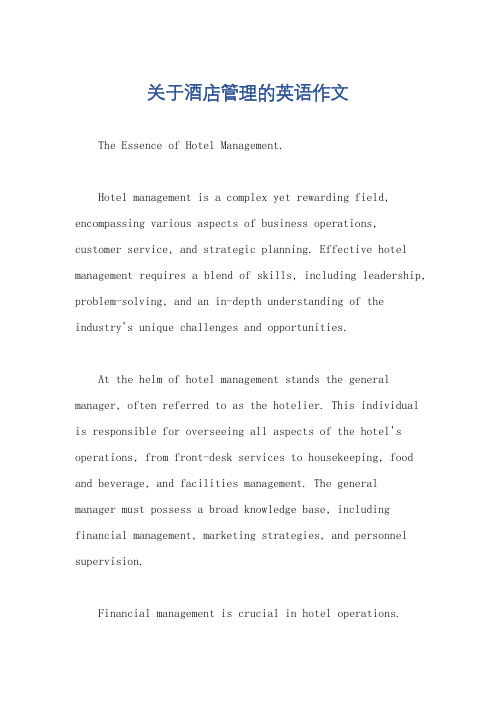
关于酒店管理的英语作文The Essence of Hotel Management.Hotel management is a complex yet rewarding field, encompassing various aspects of business operations, customer service, and strategic planning. Effective hotel management requires a blend of skills, including leadership, problem-solving, and an in-depth understanding of the industry's unique challenges and opportunities.At the helm of hotel management stands the general manager, often referred to as the hotelier. This individual is responsible for overseeing all aspects of the hotel's operations, from front-desk services to housekeeping, food and beverage, and facilities management. The general manager must possess a broad knowledge base, including financial management, marketing strategies, and personnel supervision.Financial management is crucial in hotel operations.The general manager must ensure that the hotel operates profitably while balancing revenue generation and cost control. This involves meticulous budgeting, carefultracking of expenses, and strategic pricing decisions. Marketing strategies are also integral to attracting and retaining customers. This includes understanding target market preferences, developing promotional campaigns, and maintaining a strong online presence.Customer service is the lifeblood of any hotel business. Hoteliers must create a culture that fosters exceptional customer experiences. This starts with hiring staff who are professional, polite, and attuned to guest needs. It also involves providing regular training to ensure that staffare equipped with the skills and knowledge to handlevarious situations effectively. Additionally, hotels must maintain cleanliness and comfort throughout their premises, providing guests with a welcoming and relaxing environment.Facilities management is another key aspect of hotel operations. Hotels must ensure that all facilities,including rooms, meeting spaces, restaurants, andrecreational areas, are well-maintained and up to date. This requires regular inspections, prompt repairs, and periodic renovations to maintain the hotel's competitiveness in the market.Hotel management also involves strategic planning for long-term success. General managers must anticipateindustry trends and plan accordingly. This could involve investing in technology to improve operational efficiency, implementing sustainable practices to align with environmental goals, or collaborating with other businesses to create synergies and expand market reach.In addition to these operational aspects, hotel management also involves managing human resources effectively. This includes recruitment, training, and motivating staff to achieve optimal performance. General managers must create an environment that fosters teamwork, innovation, and professional growth. They must also ensure that staff are treated fairly and with respect, fostering a positive work culture that reflects in the quality of service provided to guests.In conclusion, hotel management is a multifaceted discipline that requires a blend of strategic thinking, operational expertise, and people skills. It is about creating an environment where guests feel welcome and comfortable, while ensuring that the hotel operates profitably and remains competitive in the market. It is an exciting field that offers endless opportunities for those who are passionate about the industry and committed to delivering exceptional experiences.。
关于酒店管理的英语作文
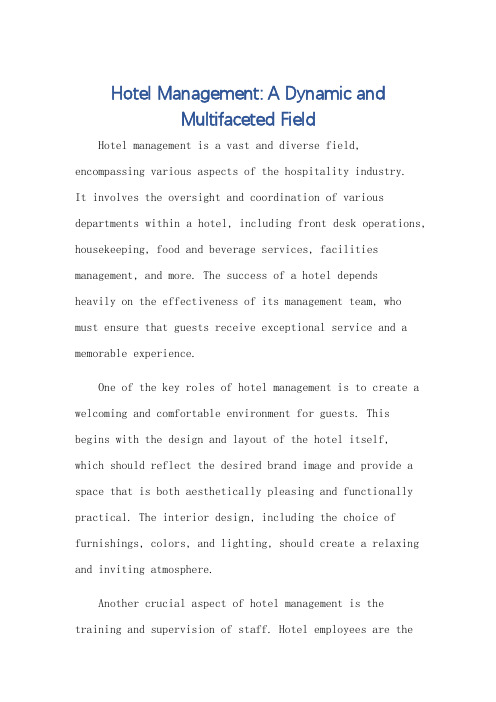
Hotel Management: A Dynamic andMultifaceted FieldHotel management is a vast and diverse field, encompassing various aspects of the hospitality industry.It involves the oversight and coordination of various departments within a hotel, including front desk operations, housekeeping, food and beverage services, facilities management, and more. The success of a hotel dependsheavily on the effectiveness of its management team, who must ensure that guests receive exceptional service and a memorable experience.One of the key roles of hotel management is to create a welcoming and comfortable environment for guests. This begins with the design and layout of the hotel itself,which should reflect the desired brand image and provide a space that is both aesthetically pleasing and functionally practical. The interior design, including the choice of furnishings, colors, and lighting, should create a relaxing and inviting atmosphere.Another crucial aspect of hotel management is the training and supervision of staff. Hotel employees are theface of the hotel and their performance has a direct impact on guest satisfaction. Management must ensure that staff are properly trained to handle various situations, from checking guests in to addressing complaints, and that they maintain a professional and friendly demeanor at all times. The efficient operation of hotel departments is also crucial. Front desk staff must be able to handle reservations, check-in and check-out procedures, and provide information about hotel facilities and services. Housekeeping departments must maintain cleanliness and tidiness throughout the hotel, ensuring that guests enjoy a comfortable and hygienic environment. Food and beverage departments must provide a variety of quality cuisine and beverages, and facilities management must ensure that all hotel facilities, such as elevators, heating and cooling systems, and security systems, are in good working order. In addition to these operational responsibilities,hotel management must also focus on marketing and revenue generation. They must develop and implement effective marketing strategies to attract new guests and maintain a loyal customer base. This may involve advertising, socialmedia campaigns, and partnerships with travel agencies and other businesses. Hotel managers must also analyze market trends and competition to ensure that their hotel remains competitive and profitable.Hotel management is also responsible for financial planning and budgeting. They must develop a budget that covers all operational costs while also generating a profit. This requires careful analysis of expenses and revenue streams, as well as the ability to make informed decisions about investing in new equipment, technology, or facilities that can enhance the guest experience and increase profitability.Finally, hotel management must be responsive to guest feedback and complaints. They must have a system in placeto collect and analyze guest feedback, and use this information to improve services and facilities. Addressing complaints promptly and effectively is also crucial to maintaining guest satisfaction and loyalty.In conclusion, hotel management is a complex and challenging field that requires a broad range of skills and knowledge. Successful hotel managers must have strongleadership abilities, excellent communication skills, and a keen understanding of the hospitality industry. They mustbe able to manage operations effectively, train and supervise staff, market the hotel, and respond to guest feedback. By doing so, they can create a hotel thatprovides guests with an exceptional experience andgenerates sustained profitability.**酒店管理的多维性与挑战**酒店管理是一个庞大且多元的领域,涵盖了酒店业的各个方面。
酒店管理专业的英文范文

酒店管理专业的英文范文The Essence of Hotel Management: An Insight into the Industry.In today's fast-paced and globally interconnected world, the hotel industry stands as a vibrant and dynamic sector, continuously evolving to meet the ever-changing demands of travelers. At the heart of this evolution lies the pivotal role of hotel management, a profession that requires ablend of creativity, strategy, and customer-centric service.The Fundamentals of Hotel Management.Hotel management encompasses a wide range of activities, from overseeing day-to-day operations to strategizing for long-term growth. The core competencies of a successfulhotel manager include excellent organizational skills, a keen understanding of the industry, and a passion for delivering exceptional customer service.The foundation of any hotel management practice is the understanding of the guest's needs and expectations. This starts with the initial booking process, where the hotel's staff ensures that the guest's requirements are met and exceeded. It continues throughout the guest's stay, from the moment they check-in to the time they bid farewell. The attention to detail and personal touch are crucial in creating a memorable guest experience.Operations Management in Hotels.The operational aspect of hotel management involves overseeing various departments such as front office, housekeeping, food and beverage, and maintenance. Each of these departments plays a vital role in ensuring the smooth running.。
酒店管理英语作文
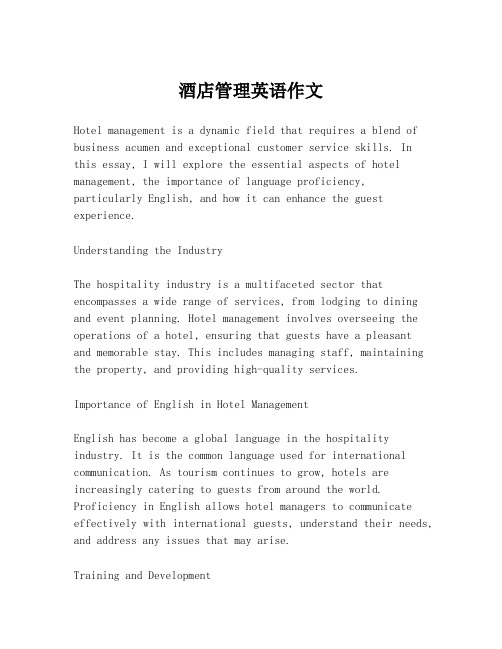
酒店管理英语作文Hotel management is a dynamic field that requires a blend of business acumen and exceptional customer service skills. In this essay, I will explore the essential aspects of hotel management, the importance of language proficiency,particularly English, and how it can enhance the guest experience.Understanding the IndustryThe hospitality industry is a multifaceted sector that encompasses a wide range of services, from lodging to dining and event planning. Hotel management involves overseeing the operations of a hotel, ensuring that guests have a pleasant and memorable stay. This includes managing staff, maintaining the property, and providing high-quality services.Importance of English in Hotel ManagementEnglish has become a global language in the hospitality industry. It is the common language used for international communication. As tourism continues to grow, hotels are increasingly catering to guests from around the world. Proficiency in English allows hotel managers to communicate effectively with international guests, understand their needs, and address any issues that may arise.Training and DevelopmentTo excel in hotel management, it is crucial to have ongoing training and development. This includes language courses, where managers can improve their English skills. Many hotels invest in English training programs to ensure that theirstaff can communicate effectively with guests. This not only enhances the guest experience but also builds the hotel's reputation as a welcoming and inclusive establishment.Cultural SensitivityIn addition to language skills, hotel managers must also be culturally sensitive. Understanding different cultures and customs can help in providing personalized service to guests. English, being a widely spoken language, can serve as a bridge to communicate and understand these cultural nuances.Technology and CommunicationTechnology plays a significant role in hotel management. From booking systems to social media, English is often the default language for these platforms. Being proficient in English allows managers to navigate these technologies and communicate with guests effectively.ConclusionIn conclusion, English is a vital tool in hotel management.It enables effective communication with international guests, fosters cultural understanding, and aids in the use of technology. Hotels that prioritize English training for theirstaff are better equipped to provide exceptional service and create a positive impression on their guests. As the world becomes more interconnected, the role of English in hotel management will only continue to grow in importance.。
酒店管理有关英语作文初中
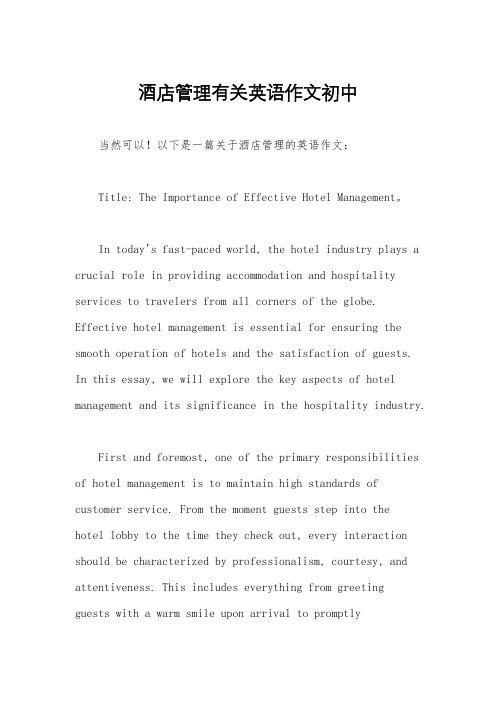
酒店管理有关英语作文初中当然可以!以下是一篇关于酒店管理的英语作文:Title: The Importance of Effective Hotel Management。
In today's fast-paced world, the hotel industry plays a crucial role in providing accommodation and hospitality services to travelers from all corners of the globe. Effective hotel management is essential for ensuring the smooth operation of hotels and the satisfaction of guests.In this essay, we will explore the key aspects of hotel management and its significance in the hospitality industry.First and foremost, one of the primary responsibilities of hotel management is to maintain high standards of customer service. From the moment guests step into thehotel lobby to the time they check out, every interaction should be characterized by professionalism, courtesy, and attentiveness. This includes everything from greetingguests with a warm smile upon arrival to promptlyaddressing any concerns or requests they may have during their stay. By prioritizing customer satisfaction, hotel management not only enhances the guest experience but also fosters positive word-of-mouth recommendations and repeat business.Additionally, effective hotel management involves meticulous attention to detail in various operational areas, such as housekeeping, food and beverage service, andfacility maintenance. Cleanliness and hygiene are non-negotiable factors that can make or break a guest's impression of a hotel. Therefore, hotel managers mustensure that housekeeping staff adhere to rigorouscleanliness standards in guest rooms, public areas, and amenities. Moreover, maintaining well-equipped facilities and offering diverse dining options can enhance the overall guest experience and differentiate the hotel from its competitors.Another critical aspect of hotel management isstrategic marketing and revenue management. In today's competitive landscape, hotels must employ effectivemarketing strategies to attract guests and maximize occupancy rates. This may involve leveraging digital marketing channels, partnering with online travel agencies, and offering promotions or discounts to attract guests during off-peak seasons. Furthermore, revenue management techniques, such as dynamic pricing and yield management, can help optimize room rates and maximize revenue based on demand fluctuations.Furthermore, successful hotel management requires effective leadership and staff training. Hotel managers must inspire and motivate their teams to deliver exceptional service consistently. This involves hiring skilled professionals, providing ongoing training and development opportunities, and fostering a positive work culture that values teamwork, accountability, and innovation. A well-trained and motivated staff can significantly contribute to the overall success of a hotel by delivering memorable experiences that exceed guest expectations.Moreover, in today's digital age, technology plays anincreasingly important role in hotel management. From online booking platforms and property management systems to guest feedback management tools and mobile concierge services, technology can streamline operations, enhance communication, and improve the overall guest experience. Hotel managers must stay abreast of the latest technological advancements and leverage them to optimize efficiency and guest satisfaction.In conclusion, effective hotel management is paramount for ensuring the success and sustainability of hotels in the competitive hospitality industry. By prioritizing customer service, maintaining high operational standards, implementing strategic marketing initiatives, fostering a skilled and motivated workforce, and embracing technology, hotel managers can create memorable experiences that keep guests coming back time and time again. Ultimately, the key to success in hotel management lies in a commitment to excellence and continuous improvement in all aspects of operations and guest service.I hope this essay meets your expectations! Let me know if you need further assistance.。
酒店管理背景英文文献

当今世界竞争是人才的竞争,高素质的人力资本是酒店业得以健康持续稳定发展的根本保证。
随着酒店从业人员素质,思想观念及自我发展意识和民主观念的不断增强,酒店这一以人为本的服务行业在人力资源管理中暴露出员工积极性低服务意识低人员流失率升高等方面的题。
因此本文从现状分析、物质激励、精神激励、以及激励体系的建立四个方面又结合了星级酒店人力资源管理的实际情况,对现代酒店管理中的激励机制做了初步的研究。
另外还提出一些开发酒店人力资本,提高酒店人力资本水平的策略及措施。
第1章酒店业的现状分析酒店业的竞争,归根结底是人才的竞争。
管理的核心问题,是人的问题。
在酒店管理中运用人力资源管理获得竞争优势的案例越来越多。
案例:报纸杂志不断刊登文章报道服务业的不良状况,一线员工错误不断、态度恶劣简直是置顾客于不顾。
缺少技术熟练的员工,面对高人员的流失率,深受其苦的服务业必须向那些与顾客接触的企业注入新的生命力。
分析研究表明:当一个人被高度激励时,他会努力工作主动向顾客提供尽可能好的服务;而没有被激励时,他会尽可能的节省精力。
现代管理者的首要任务就是要点燃员工内心的工作热情之火,以此驱动员工在工作中展现的出色,从而实现组织所期望的最佳绩效。
在企业中出色的领导者已经认识到这点,只有“以人为本”的企业管理,才能在如今激烈的竞争中生存、发展、兴旺.管理是一门艺术,员工激励是艺术中的艺术,员工是企业的灵魂.设计有效的员工激励机制,才能提高员工的积极性.使其才能在不同的企业文化不同的组织结构和不同的企业环境中发挥其最大的潜能,从而实现组织的期望目标.首先姑且让我把激励方法分为三类:物质激励、精神激励和激励机制的设计,通过对这三类的分析和了解,才能让我们理解激励机制的作用和意义,从而才能为企业建立有效激励体系。
下面我们把激励的方法分为两类:物质激励和精神激励;通过对这些激励方法的了解和认识,才能让我们意识到激励机制的作用。
第2章物质激励物质激励是指通过物质刺激的方法鼓励职工工作。
- 1、下载文档前请自行甄别文档内容的完整性,平台不提供额外的编辑、内容补充、找答案等附加服务。
- 2、"仅部分预览"的文档,不可在线预览部分如存在完整性等问题,可反馈申请退款(可完整预览的文档不适用该条件!)。
- 3、如文档侵犯您的权益,请联系客服反馈,我们会尽快为您处理(人工客服工作时间:9:00-18:30)。
当今世界竞争是人才的竞争,高素质的人力资本是酒店业得以健康持续稳定发展的根本保证。
随着酒店从业人员素质,思想观念及自我发展意识和民主观念的不断增强,酒店这一以人为本的服务行业在人力资源管理中暴露出员工积极性低服务意识低人员流失率升高等方面的题。
因此本文从现状分析、物质激励、精神激励、以及激励体系的建立四个方面又结合了星级酒店人力资源管理的实际情况,对现代酒店管理中的激励机制做了初步的研究。
另外还提出一些开发酒店人力资本,提高酒店人力资本水平的策略及措施。
第1章酒店业的现状分析酒店业的竞争,归根结底是人才的竞争。
管理的核心问题,是人的问题。
在酒店管理中运用人力资源管理获得竞争优势的案例越来越多。
案例:报纸杂志不断刊登文章报道服务业的不良状况,一线员工错误不断、态度恶劣简直是置顾客于不顾。
缺少技术熟练的员工,面对高人员的流失率,深受其苦的服务业必须向那些与顾客接触的企业注入新的生命力。
分析研究表明:当一个人被高度激励时,他会努力工作主动向顾客提供尽可能好的服务;而没有被激励时,他会尽可能的节省精力。
现代管理者的首要任务就是要点燃员工内心的工作热情之火,以此驱动员工在工作中展现的出色,从而实现组织所期望的最佳绩效。
在企业中出色的领导者已经认识到这点,只有“以人为本”的企业管理,才能在如今激烈的竞争中生存、发展、兴旺。
管理是一门艺术,员工激励是艺术中的艺术,员工是企业的灵魂。
设计有效的员工激励机制,才能提高员工的积极性。
使其才能在不同的企业文化不同的组织结构和不同的企业环境中发挥其最大的潜能,从而实现组织的期望目标。
首先姑且让我把激励方法分为三类:物质激励、精神激励和激励机制的设计,通过对这三类的分析和了解,才能让我们理解激励机制的作用和意义,从而才能为企业建立有效激励体系。
下面我们把激励的方法分为两类:物质激励和精神激励;通过对这些激励方法的了解和认识,才能让我们意识到激励机制的作用。
第2章物质激励物质激励是指通过物质刺激的方法鼓励职工工作。
它的主要表现形式有正激励,如发工资、奖金、津贴、福利等;负激励如罚款等。
物质需要是人类的第一需要,是人们从事一切社会活动的基本动因,所以,物质激励是激励的主要模式,也是目前我国企业内部使用的非常普遍的一种激励模式。
2.1正激励法奖励是指饭店组织对员工的良好行为举止或工作表现给予的积极肯定与表彰。
奖励作为员工激励的一种手段,目的在于促使受奖励的员工将他们的模范行为加以保持和发扬,并成为全体员工的表率,为奋员工队伍的士气起到积极的推动作用。
运用好这一手段还要注意以下几点:(一)奖励要及时,且奖励方法要不断创新。
(二)注意对其他员工的心理疏导化。
不断定下新的目标,淡化过去着眼未来,树立正确的公平观。
(三).重视对团体的奖励,在现代饭店活动中组织目标的实现,员工个人的尊严与成就,都需要经过群体的共同努力才能得以实现,因此重视团体激励,有利于在员工中形成统一的思想认识,增强凝聚力提高员工的竞争力。
2.2负激励法惩罚是一种负激励,是现代饭店为了纠正员工工作中的不良行为,而才取的一种强制措施。
应用得当,对不妥行为能取得很好的威慑作用。
但万万不可以惩罚为主,只能作为一种辅助手段,否则就会适得其反。
在运用这一手段时要注意以下几点:(一)不能不教而诛。
应当把教育放在第一位,对屡教不改或造成严重后果者实施惩罚,且注意不可以罚代管。
(二)选择合理有效的惩罚方式,且不可打击面过大,还要注意不可全盘否定,以小即大,伤害员工的心理。
(三)将灵活性与原则性向结合,坚持原则,执法要严。
在严格依照规定制度的前提下,一定的灵活性是完全必要的,因此在激励时要严格合理,严的合情,从而达到教育一大批的目的,虽说,物质激励不是万能的,但我们要合理的运用物质激励这一把双刃剑。
例如:在洲济集团就有这样的一个管理方案,当员工第一天来到公司工作时,公司就会对员工的一些家庭情况经济条件等多方面做一个了解,对这一了解就建立了员工的个人资料,在日常的工作中有关人员对资料进行分析,在以后的工作中,管理者就会对以前的分析对员工实施有效的激励方案。
全面的了解员工的需求和工作质量的好坏,不断的根据情况制定精确的激励方法,从而调动酒店的每为员工实现应有的业绩。
第3章精神激励美国管理学家皮特就曾指出“重赏会带来副作用,因为高的奖金会使彼此封锁消息,影响工作的正常开展,整个社会的风气就会不正”。
因此企业单用物质激励不一定能起到作用,所以又产生另一种激励方法——精神激励。
就这一激励我大致分为以下几种:目标激励竞争激励及参与激励等。
In today's world competition is the talent competition, high-quality human capital is the hotel industry continued to be healthy and stable development of the fundamental guarantee. With the hotel employees in the quality of ideas and sense of self-development and growing the concept of democracy, the hotel that the people-oriented service sector in terms of human resourcemanagement staff revealed low awareness of service with low staff turnover rate increased the title and so on. This paper analyzes the status quo, therefore, material incentives, moral incentives, as well as the incentive system and a combination of four-star hotel human resources management of the actual situation of the modern hotel management incentive mechanism has done a preliminary study. In addition, some hotels in human capital development to improve the human capital level of the hotel's strategy and measures.Chapter 1 Analysis of the hotel industryHotel industry, in the final analysis is the talent competition. Management of the core issue is the question. In hotel management in the use of human resources management to obtain a competitive advantage more and more cases.Case: newspapers and magazines continue to publish articles reporting the adverse conditions of the service sector, front-line staff error continuously, the attitude of the poor is ignored customers home. Lack of skilled staff, in the face of the high rate of loss of the services sector is suffering to those who come into contact with customers to inject new vitality enterprises. Analysis showed that: when a person was a high degree of motivation, he will take the initiative to work hard to provide the customers with the best possible service; and have not been inspired, he will save energy as much as possible. The primary task of modern managers is to kindle the enthusiasm of staff working inside the fire, to drive the staff work to show the outstanding organizations in order to achieve the best performance expectations. In the enterprise has been an excellent leader in recognition of this point, only the "people-oriented" corporate governance can be in today's fierce competition for survival, development, and prosperity. Management is an art, staff motivation is the art of art, the soul of the enterprise employees. Staff to design effective incentive mechanism to increase the enthusiasm of the staff. So that it can be in various different corporate culture and organizational structure of the enterprise environment to play their maximum potential in order to achieve the expectations of the target organizations. Let us first of all, let me incentive divided into three categories: material incentives, moral incentives and the design of incentive mechanisms, through these three types of analysis and understanding, so that we understand the role of incentive mechanism and significance of the enterprise so as to establish an effective incentive system. We are encouraged by the following methods to fallinto two categories: material and spiritual encouragement and incentives; incentives of these methods of understanding and knowledge in order to let us realize that the role of incentives.Chapter 2 material incentivesMaterial incentives is the way to the adoption of incentives to encourage trade union work.Its main manifestations of positive incentives, such as wages, bonuses, allowances, benefits, etc.; negative incentives such as fines. Material needs is the first of human needs, is engaged in social activities of all the basic motive, therefore, the material incentives to encourage the main mode is the internal use of Chinese enterprises are very common mode of an incentive.Excitation method is 2.1Hotel reward is the good organization of the behavior of employees or work performance and in recognition of the positive. Incentives as a means of staff motivation, incentives designed to induce employees by their exemplary acts to maintain and carry forward and set an example for all staff, for staff morale Fen play a positive role in promoting. Make good use of this means we must pay attention to the following: (a) awards to be timely, and an incentive to innovation. (B) the attention of other employees of the psychological. Constantly set new goals, to play down the past focus on the future, to establish a correct view of the fair. (C). Emphasis on incentive groups, activities in a modern hotel in the achievement of organizational goals, personal dignity and achievements, both need to go through the joint efforts of groups can be achieved, the emphasis on incentive groups, is conducive to the formation of a unified staff the ideological understanding, and enhance the cohesion of staff to enhance their competitiveness.2.2 negative excitation methodPunishment is a negative incentive is a modern hotel staff in order to correct the bad behavior, and to obtain a compulsory measure. Applied correctly, can be made to the wrong acts of a very good deterrent. However, employees must not be punished mainly as a supplementary means only, otherwise it will backfire. In the use of the means to pay attention to the following points: (a)those that can not teach and to punish. Give education top priority should be on the incorrigible or those who have serious consequences for the implementation of punishment, and punishment can not be hosted attention. (B) select a reasonable and effective punishment, and the scope can not be too large, but not a total negation of the attention to small or large, the psychological harm to employees. (C) will be a matter of principle to the combination of flexibility and principles, adhered to more stringent enforcement. In strict accordance with the provisions of the system under the premise of a certain degree of flexibility is absolutely necessary, so in a reasonable incentive to be strict, strict fair, a large number so as to achieve the purpose of education, although, material incentives is not a panacea, but we have to reasonable use of material incentives that a double-edged sword. For example: in the Jeju Island Group has a management program such that when the staff came to the company the first day of work, the company will staff the case of some families, such as economic conditions in a multifaceted understanding of the understanding on the establishment of a staff personal data, in theday-to-day work of the staff analysis of data, work in the future, managers will be on the previous analysis of the implementation of effective employee incentive program. Comprehensive understanding of the needs of employees and the quality of work is good or bad, according to the situation of constant incentive to develop accurate, thereby mobilizing the hotel staff to achieve each and every performance should be.Inspire the spirit of Chapter 3Management experts point out that Pitt had "side-effects will be rewarded, because of the high prize money would blockade the news to each other and affect the normal development, the social atmosphere will be errors." Enterprise alone, therefore the material may not be able to play the role of incentives, so they have another incentive - the spirit of encouragement. On this incentive, I roughly divided into the following categories: goals motivation and participation in competitive incentives and other incentives.。
